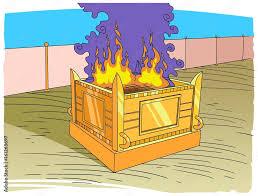The Sabbath Offerings
28: 9-10
The Sabbath Offerings DIG: Why were the lambs doubled on the Sabbath? How is this related to the doubling of the sacrifices on the festival of Sukkot? Is there a connection between Sabbath and Sukkot? Why do you think there is additional teaching on the offerings at this point in Numbers?
REFLECT: What is the significance of the extra two lambs to you? What have you done that is extra in your worship of the Lord? What special things do you do to remind you of what God has done for you? How do these things help to strengthen your relationship with God? Why is Sunday not the same as the Sabbath?
Shabbat grants us a measure of peace and tranquility, a foretaste of the Kingdom.

The Shabbat is an appointed time (see the commentary on Leviticus, to see link click Dw – God’s Appointed Times). Sunday is not “the Christian Sabbath.” Sunday is the first day of the week (Luke 24:1), while the Sabbath is the seventh day of the week (see the commentary on Genesis Aq – By the Seventh Day God Had Finished His Work). Although the Sabbath itself had been set apart (see the commentary on Deuteronomy Bo – Observe Yom Shabbat), this is the first instruction given concerning Shabbat ritual. It was a day of rest, except for the priests, who had additional service to perform before ADONAI. The Israelites were to offer two male lambs in their first year and without defect, with one gallon of fine flour as a grain offering, mixed with olive oil, and its drink offering. This is the burnt offering (see Leviticus Ai – The Burnt Offering: Accepted by God) for every Shabbat, in addition to the tamid offerings (see Ex – The Tamid Offering), the regular burnt offering and its drink offering. The Sages teach that the additional Sabbath lambs were offered just after the priesthood ate the bread of the Presence and offered up the frankincense that accompanied it.
The additional (Hebrew: mussaf) offerings of the Sabbath are remembered in the traditional synagogue liturgy with the mussaf prayers: a repetition of the Shemoneh Esrei and some liturgical songs such as the well-known Ein Keiloheinu (There is None Like Our God) and the Adon Olam (Master of the World). In some Messianic congregations, instead of repeating the entire Shemoneh Esrei, they simply pray the Lord’s Prayer (see the commentary on The Life of Christ Gy – Lord, Teach Us to Pray) together as a substitute.
The significance of the extra two male lambs on the Sabbath day is that the lambs were a double portion. It is the sign of the Sabbath. On the sixth day, in preparation for the Sabbath, the children of Isra’el were commanded to gather a double portion of manna (Exodus 16:22-23). The double portion was to last throughout the Sabbath, a day on which food preparation and gathering is forbidden. The two loaves of traditional challah bread (see Ci – The Challah), which adorn Sabbath tables even to this day, are a remembrance of the double portion of Shabbat. Ordinarily, a family would have only one loaf. On the Sabbath, which is the Sabbath, the amount is doubled. The same principle holds true at God’s table (see the commentary on Exodus Fa – Build Altar of Acacia Wood Overlaid with Bronze). Therefore, on Shabbat, the regular weekday portion is doubled. Instead of two lambs for burnt offerings, there were four.
In Jewish observance, it is common for a family to spend sparingly on their meals all week long in order that they might be able to better honor the Sabbath with a sumptuous spread of foods and delicacies. One should spend below his means on all his weekday meals that he might spend beyond his means in preparation for the Shabbat.
For believers, the appointed time of the Sabbath carries great significance. Not only is it the Bible’s most often repeated commandment, but it is also a foretaste of the Messianic Kingdom for which we long. The celebration of the Shabbat grants us a measure of the peace and tranquility, which will characterize the Kingdom on Earth. We cease from work and enter into the rest of Messiah who said: Come to Me, all who are weary and heavy-laden, and I will give you rest (Matthew 11;28).644
Dear Heavenly Father, Praise and thank You so much for Your wisdom in providing a Shabbat, a day each week to rest and recharge. Rest and peace flow into my mind and heart when I praise You. Meditating on how wonderful You are brings joy. I find comfort when I come to You with my problems and lift up Your name in seeking Your help, knowing that You are always right there beside me to help and to guide me. For God Himself has said: I will never leave you or forsake you (Hebrews 13:5c).
You are such a gracious Shepherd (Psalms 23)! You are always watching out to protect and guide me to green pastures. Your love and compassion are so wonderful! For as high as the heavens are above the earth, so great is His mercy for those who fear Him. As far as the east is from the west, so far has He removed our transgressions from us. As a father has compassion on his children, so ADONAI has compassion on those who fear Him (Psalms 103:11-14). Thank You for the joy of resting on Shabbat and being refreshed by praising You. In Messiah Yeshua’s holy Name and power of His resurrection. Amen



Leave A Comment